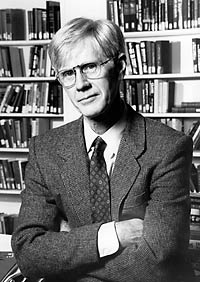UC Berkeley Point of View
Physician who helped stem the SARS epidemic now a prisoner of China's political time warp
Orville Schell is a China scholar and dean of the Graduate School of Journalism at the University of California at Berkeley. Schell originally wrote this article for Project Syndicate, a global column syndication service.
On June 1, Jiang Yanyong, a surgeon at Beijing 301 Military Hospital, and his wife, Hua Zhongwei, also a physician, left home to pick up a visa at the U.S. Embassy. They have not been heard from since.
Family and friends assumed that Public Security Bureau police detained them and that the couple, both 72 years old, would be released after June 4, the 15th anniversary of the Tiananmen Square massacre. But on June 8, unnamed officials asked the doctors' son to collect some personal effects for his parents, including dentures, and deliver them to the authorities. It was not a good omen.
 Orville Schell (photo Jane Scherr) |
With China's economy booming, foreign investors flocking, and the country's role in global markets ever more central, the disappearance of this couple hardly caused a break in China's hectic march. But the disappearance underscores the ongoing imbalance between economic and political reform.
Jiang is no ordinary doctor. Long ago he felt compelled by duty and patriotism to step beyond the role of a surgeon and become a public citizen. His odyssey began on June 4, 1989, when he spent a horrific night trying to save hundreds of wounded and dying victims who flooded through his hospital's 18 operating rooms as the People's Liberation Army opened fire on its way to Tiananmen Square. Jiang, traumatized and anguished, nonetheless kept his silence.
However, as the SARS epidemic flared up in 2003, Jiang realized in April that Health Ministry reports of only 19 confirmed cases of the disease in Beijing were bogus; he knew of almost 10 times that amount. He decided to go public. ''I felt I had to reveal what was happening, not just to save China, but to save the world,'' he said.
His exposé of the SARS epidemic cover-up forced China's government to confront the disease more openly and aggressively, averting a public-health catastrophe. But if Jiang became a hero in the process, he also was marked as insubordinate, the kind of potentially uncontrollable person that the Chinese Communist Party fears.
Indeed, the party's worst fears were realized this past March just before the 15th anniversary of the Tiananmen massacre. As the National People's Congress was meeting, Jiang broke his silence by writing a long, heartfelt appeal to the leaders of China. In it, he charged that ''a small number of leaders who supported corruption'' had resorted to measures on June 4 that were ''unprecedented in the world or China'' when it used "tanks, machine guns and other weapons to suppress totally unarmed students and citizens.''
In grim detail, his letter described the bloody mayhem that the slaughter brought to his hospital and the hysteria of people as they arrived to find children and loved ones dead. Without deference to or fear of the party, Jiang castigated China's leaders for the way that they "mobilized all sorts of propaganda to fabricate lies and used high-handed measures to silence the people across the country.''
Finally, Jiang implored the Party to reassess the 1989 student movement by ''reversing its verdict'' from ''counter-revolutionary rebellion'' or ''political storm'' to "patriotic acts that had the support of the overwhelming majority of the people in Beijing and the country.''
''Our party must address the mistakes it has made,'' he concluded unambiguously. "Anyone whose family members were unjustly killed should voice the same request.''
Before giving his name, address and phone number, he said, "Of course, I have considered the consequences that I might encounter after writing this letter. But I have decided to tell you all the facts.''
How does one reconcile an isolated retrograde incident such as the disappearance of this couple with the hopeful progress of the ''Chinese economic miracle'' that has so transformed this once seemingly desperate, backward land?
China today is a contradiction. The tensions between its increasingly open economy and its still closed political system and institutions (established during the Stalin era in the 1950s) make China the most conflicted nation of consequence in the world today.
The old state planner Chen Yuan once cautioned that Chinese reformers had created ''a bird-cage economy'' in which a capitalist bird was growing within a socialist cage. His implication was that, unless party leaders were careful, this capitalist bird would burst out of its socialist cage, spelling an end to China's Marxist-Leninist revolution.
Indeed, the old socialist economic bird cage has been largely burst by China's capitalist reforms, releasing with a vengeance a mutant ''people's republic'' into the global marketplace of consumerism.
But the demolition process that has transformed or razed so many of China's old Stalinist economic institutions has not been matched by a demolition of stultifying political structures. Although Chinese leaders speak of ''one country, two systems'' as their formula for governing Hong Kong – and possibly Taiwan some day – their slogan is far more relevant to China itself, given the coexistence of a capitalist economic system within a Leninist political system.
Jiang may become a millionaire, wear any clothes he likes, redecorate his living room even buy a car, but he cannot inform the public about an epidemic or write government officials an honest letter of admonition. Does this matter? That depends on whether one believes that Leninist capitalism is a viable and stable form of government for China over the long term.
